Want to install solar systems that last and earn you steady fees?
Want clients to trust your work and avoid costly rework?
This guide shows the exact steps you follow to get certified, legal, and market-ready as a solar installer in Nigeria.
What this post covers
- Who issues recognition, certification, and product approvals in Nigeria.
- The step-by-step route you follow to become a certified installer.
- Practical checklist you can use today.
- Real examples of training programs and standards in Nigeria.
- How to package your skills so employers and customers hire you fast.
Read this if you want a practical, no-fluff road map that turns basic electrical skills into a credible solar installer profile.
Why certification matters for you
You build systems people will trust.
You reduce safety risks on roofs and walls.
You win bigger jobs and higher rates.
Clients ask for proof of competence.
Government tenders ask for compliance and product approvals.
Banks and funders require installers who follow standards.
If your panels fail or wiring is wrong, you pay for the fix.
Certification helps shift that risk away from you.
Real buyers prefer installers tied to recognized industry bodies.
Industry bodies and regulators hold training partners to standards.
When you join that system, your credibility rises fast.
Who issues the recognition and what each body does
Standards Organization of Nigeria (SON)
- Sets product standards and runs SONCAP, the conformity program for imports.
- Solar panels, inverters, meters and in many cases accessories must meet SON rules before sale and wide installation.
Renewable Energy Association of Nigeria (REAN)
- Industry association that vets installers and runs advocacy, training links and accreditation for members.
- Customers and agencies look to REAN membership as a signal of professional standing.
Nigerian Electricity Regulatory Commission (NERC)
- Regulates electricity businesses and issues licenses or authorizations for defined services.
- If you plan to offer metering or run large commercial schemes you will interact with NERC licensing rules.
Nigerian Electricity Management Services Agency (NEMSA)
- Offers safety and technical oversight and partners with training centers for competence verification.
- Some training centers advertise NEMSA collaboration for installer competence.
Training bodies and universities
- Several accredited training providers and university extension centers run recognized certificate courses for PV installation and inverter repair.
- These programmes issue certificates employers accept when hiring technicians
Vendor and manufacturer certifications
- Brands like Huawei or system vendors run installer exams.
- Vendor certs open warranty support and vendor-level projects.
MANCAP / NIS (for local manufacturing)
- If you assemble or manufacture panels, MANCAP and the Nigerian Industrial Standards apply. That is business level, not individual installer level.
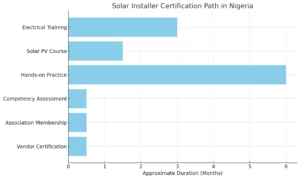
Step-by-step process to become a certified solar installer in Nigeria
Below are the practical steps you follow. Use them as a checklist and tick items off as you complete them.
- Get core electrical skills
- Complete an electrical technician course or apprenticeship.
- Aim for foundational knowledge: wiring, circuit protection, basic digital metering, earthing and safety.
- Many employers expect you to read single and three-phase wiring and to wire distribution boards.
- If you come from an electrical background, you can shorten your learning curve.
- Join a recognized training course
- Enroll in a Solar PV installation or solar inverter repair course run by a credible institute.
- Look for courses that include hands-on stringing, inverter commissioning and IV curve testing.
- Example providers in Nigeria: Renewable Energy Technology Training Institute (RETTI), Asteven Energy Institute, and several solar power training centres that partner with REAN or NEMSA.
- Complete hands-on hours
- Work with an installer on live jobs.
- Keep a record of systems you helped install: type, size, client name and your role.
- Build at least a portfolio of 10–30 residential installations or several commercial string installations.
- Pass a competency assessment
- Choose a programme that includes a competency test or practical assessment.
- Some courses have vendor tests or third-party competency checks aligned to COREN or NEMSA standards.
- Get association endorsement
- Join REAN or a local professional body.
- Association membership shows customers you operate within national industry norms.
- Secure product conformity for the systems you use
- Use solar modules and inverters with SON or SONCAP certification.
- Keep product certificates and invoices for every installation. This protects warranty claims and helps you win contractor approvals.
- Obtain any business licences you need
- If you offer commercial services, register a company and get tax and customs identifiers.
- If you import equipment, register with the Nigerian Customs Service and obtain an Importer/Exporter Number.
- Some solar businesses must obtain additional approvals before tendering for government projects.
- Pursue vendor certifications and advanced credentials
- Take vendor and product-specific courses (e.g., inverter vendor certification).
- Use those certificates to unlock higher-value projects and warranty support.
- Keep records and build references
- Maintain a file for each project with design notes, product certificates, handover forms and client sign-offs.
- These files show proof of competence when bidding or applying for tenders.
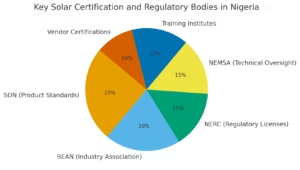
Practical timeline and cost example (realistic, not fixed)
This block gives you a sample path you can follow with rough time and cost ranges. Use it to plan.
- Basic electrical training: 1–3 months if you attend an intensive course.
- Solar PV installer course with hands-on module: 2–6 weeks. Some weekend or modular courses run longer.
- On-job experience portfolio: 3–12 months of active installations.
- Vendor certification: 1–3 days of training plus exam.
- Business registration, tax, and import codes: 1–4 weeks depending on specifics.
Cost ballpark
- Short certificate course: low to mid range (local tuition).
- Vendor cert: small fee per exam.
- Product certification for businesses importing modules or inverters: larger cost for product testing and SONCAP fees.
Real examples you can check now
- Daystar Power set up a third-party installer training program to fast-track technicians into live installations. That is a model you can replicate when scaling.
- ONESUN obtained SONCAP approval for its PV system to be sold and widely used in Nigeria. This shows how product conformity and installer competence go together.
- Asteven Energy Institute runs a Solar Photovoltaic Installation course that includes competency verification recognized by industry bodies. Use programs like this for a credible certificate.
Choosing a training provider — checklist
Ask each provider these exact questions
- Does the course include hands-on system installations?
- Which assessment or certificate do you receive after completion?
- Do you get access to practical tasks like IV curve testing and inverter commissioning?
- Is there a partner body (REAN, NEMSA or a university) endorsing the certificate?
- Do they include market introductions or placement help?
Signs of a reputable programme
- A clear practical module schedule.
- Industry endorsements or vendor partnerships.
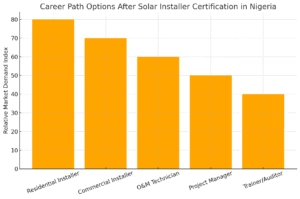
How to prepare for competency exams and interviews
What employers test
- Correct sizing of PV arrays and inverters.
- String and combiner design.
- Earthing and lightning protection basics.
- Wiring, switching, and protection for inverters and batteries.
- Commissioning tests like IV curves and performance checks.
Study plan
- Practice wiring a small off-grid kit from end to end.
- Learn how to use a clamp meter, multimeter and IV curve tracer.
- Memorize product datasheets for common inverters and modules you work with.
- Keep a record of installations you worked on. Employers ask for project specifics.
Example interview answer
- Question: “How did you size the battery bank on your last job?”
- Answer: State the load list, autonomy target, calculation steps and why you chose that battery and inverter. Show invoices and handover forms.
How to present yourself to clients and employers
Create a short installer dossier
- One page summary of certifications and association memberships.
- Project list with photos and client contacts.
- Product certificates for modules and inverters used.
- Contactable references.
What to say to a client
- Show the product certificate.
- Show your practical certificate and mention any vendor certifications.
- Offer a simple performance guarantee tied to product warranties.
Common pitfalls installers face and how to avoid them
Poor product choice
- Use products without SONCAP and you create warranty and customs problems. Check product certificates.
No records
- Without job records you lose bids. Keep handover forms for every system.
Missing association ties
- Customers trust installers who show REAN membership or similar association endorsement.
Fast track options for experienced electricians
If you already have electrical experience
- Take a short PV installation course with competency assessment.
- Secure vendor certification for the inverter brands you target.
- Build a 10-job portfolio within three months. This opens the door to commercial work.
Career paths after certification
- Residential installer for homes.
- Commercial systems installer for small businesses.
- O&M technician for large systems.
- Site supervisor or project manager.
- Trainer or quality auditor with the right experience and certifications.
Vendor certificates and association membership speed career movement.
One-page action checklist you can use now
- Enrol in an accredited solar PV installer course.
- Start hands-on work with a contractor and document each job.
- Get vendor certifications for one or two common inverters.
- Use only SONCAP or NIS-approved solar modules and keep certificates.
- Join REAN and display membership on proposals.
- Register your business and obtain import and tax IDs if you trade in equipment.
Quick FAQs
Who must get SON or SONCAP approvals?
- Product importers and sellers must ensure products meet SON rules. Keep import certificates and test reports.
Does NERC license every installer?
- NERC issues licenses for specific electricity services and activities. For small residential work, NERC licensing is not the routine step. For large commercial or metering services you may need to follow NERC authorization paths.
Are vendor certificates required?
- Not required by law for all work. They often unlock higher-value projects and warranty support.
Which association matters most?
- REAN is the primary industry association for renewable energy in Nigeria and is widely recognized.
Final practical thought
Ask yourself
- Where will you install most systems: homes, shops or larger sites?
- Which inverter brands do you want to support?
- Do you want to run your own business or join an established installer?
Pick one clear answer.
Choose the training and vendor certification that matches that path.
Work on three real installations. Then use your portfolio to win the next three.

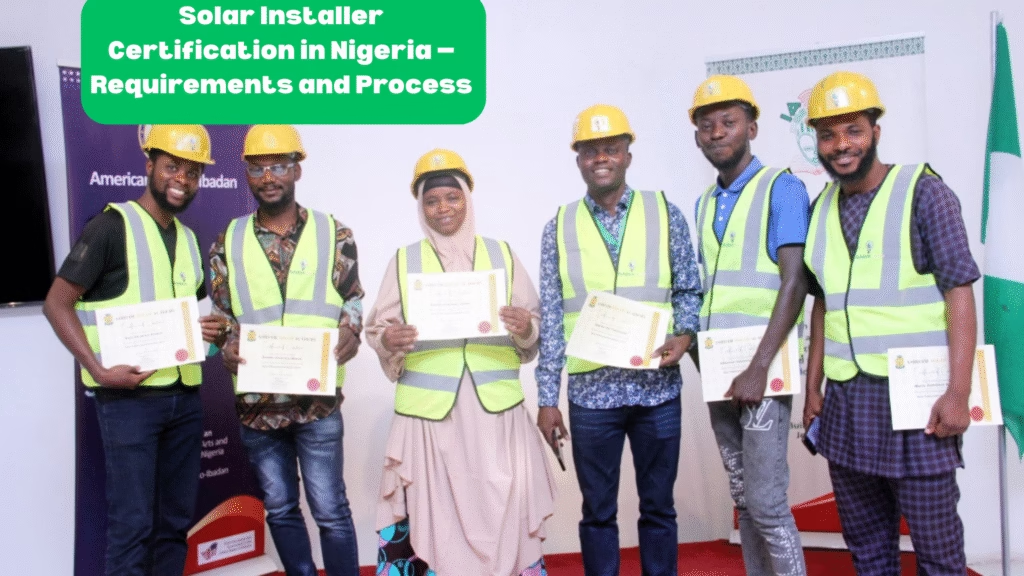
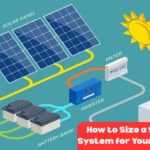
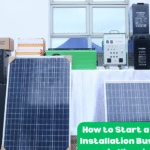
How do I register
I will love to be part
I wish to be part of the training and become a competent installer
I am fully interested in learning and attending the courses